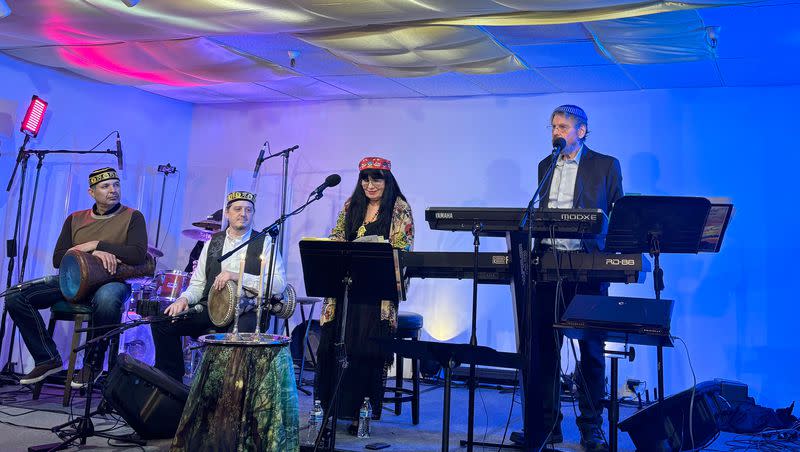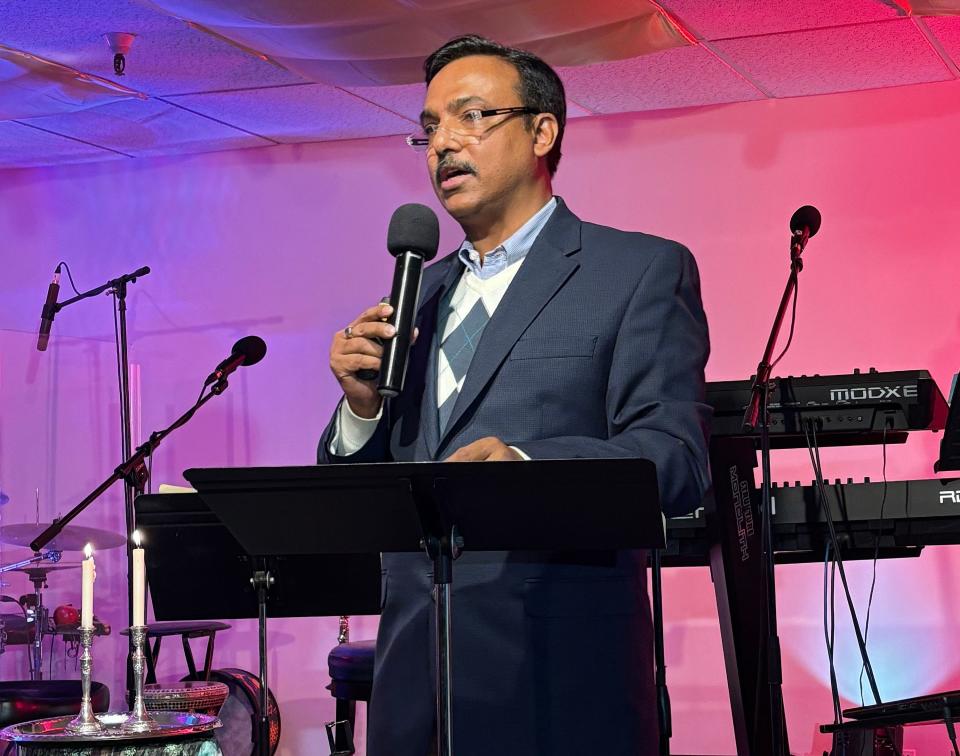Unique Jewish group welcomes interfaith message from Hindu professor

Feb. 9 turned out to be a snowy day in Salt Lake City. Rabbi Alan Scott Bachman thanked a group of two dozen people sitting in front of him in a room on the third floor of the Salt Lake Center for Spiritual Living.
“I don’t know what to tell you. Maybe sue the groundhog, right? He said our service would be beautiful and sunny,” joked Rabbi Bachman, who previously served as the assistant attorney general in Utah for three decades. He now serves as a partner in the Fetzer Simonsen Booth and Jenkins law firm by day, and as a rabbi by night.
Rabbi Bachman’s Shabbat service is unique, as it involves the bringing together of music and people of other faiths. The rabbi quoted Isaiah 56:7, in which Isaiah says in the Messianic age: “I will bring them to my holy mountain of Jerusalem and will fill them with joy in my house of prayer.”
“So, we thought, although it’s not Messianic era, let’s have it right now,” Rabbi Bachman said, explaining why his group, which started last March, is called the House of Prayer for All Peoples.
The attendees included some who tuned in online from Arizona and California. Bachman told them to expect a talk from Promothesh Chatterjee, a business professor at the University of Utah, who was invited to give a short lecture on Vedanta, a school of Hinduism. The rabbi said he would give his sermon before and after Chatterjee’s lecture.
Rabbi Bachman conducted the service alongside his band, Desert Wind, led by vocals from Bachman, who was also on the keyboard, and Rebbetzin Andalin Shekinah on the flute. They performed sermons and songs — some composed by the rabbi himself.
Other musicians included Ricardo Romero and Adnan Jasim on drums, and Bryan Bale on percussion.
The band played a fusion of jazz, rock, and world-beat music, while Rabbi Bachman discussed teachings from the Torah and his views on similarities between Judaism and other faiths.
In one instance, he examined the way different religions prescribe people to wear reminders of the faith’s teachings. For example, members of The Church of Jesus Christ of Latter-day Saints wear garments, Jewish people wear yarmulkes, and the Sikhs carry and maintain five things — a turban-covered head, a steel bracelet, a small wooden comb, undershorts and a knife, the rabbi said.
In between songs, Bachman asked: “So, you might be wondering what we are doing with a Hindu professor at a Jewish service.”
“If we don’t get together with people we think of as the other, we won’t learn about (what) they have to bring to the table,” said the rabbi, who has chaired the Salt Lake Interfaith Roundtable in the past. “Every faith, every belief system has some medicines to help us.”
The House of Prayer for All Peoples has previously invited faith leaders from Christian, Muslim and Buddhist communities to speak at their services.
Bachman revealed his rule for approaching interfaith relationships: “Just don’t tell somebody else what their faith is. Let them tell you,” he said.
Rabbi Bachman said he was taught by non-Hindus that it was a polytheist religion, where they worship more than one God. When he went to a Hindu temple, he asked someone about polytheism. They told him it’s like “icons on your laptop.”
“You click on this icon for this God or Goddess, but they all lead to the One Source,” he said. Rabbi Bachman then introduced Chatterjee, who is a part of the Vedanta Society, an American offshoot of the Indian Ramakrishna movement forged after a 19th-century spiritual leader.
Sri Ramakrishna devoted his early life to learning about different spiritual teachings, including those of Hinduism, Christianity and Islam, the professor said. But ultimately, “he proclaimed that all paths lead to the same God and the same truth,” said Chatterjee, who added that Ramakrishna has been “regarded as the Prophet of the harmony of religions.”

The professor explained, “When you realize your true inner nature, then you see there is no difference between you and anyone else here.”
This awakening state can be reached through devotion to God, knowledge of and about the self, acts of service or meditation. “Everything that you do is an offering to God,” Chatterjee added.
He ended his lecture by quoting Swami Vivekananda, a chief apostle of Sri Ramakrishna who first visited the U.S. in 1983 to appear at the Parliament of Religions in Chicago. Vivekananda believed religious doctrines, rituals, scriptures and temples are all but secondary details when it comes to manifesting divinity in ourselves, said Chatterjee.
After Chatterjee spoke, the rabbi and his band performed more songs before the attendees got to eat pizza — vegan and vegetarian options only.
Chatterjee later told the Deseret News he sees a lot of similarities between Judaism and Hinduism. His religion views God as omniscient and omnipresent, which is “exactly what they were talking about” at the Shabbat service, he said.
He added that some of the music lyrics the rabbi sang sounded like words out of Hindu scriptures.
Chatterjee said Salt Lake City doesn’t have a Vedanta Society, which believes God is an omnipotent, all-pervading, supreme essence in the universe. But a small group of devotees still get together to listen to monks give lectures.

